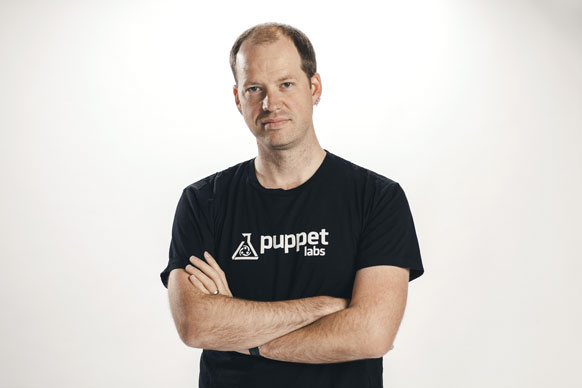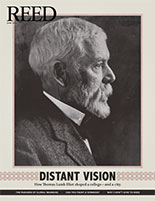
IRIS login | Reed College home Volume 93, No. 2: June 2014
Life Beyond Reed (continued)

Photo by Matt D'Annunzio
Luke Kanies ’96
CEO, Puppet Labs, Portland
Kanies quit a corporate job with a six-figure income to start his own software company because, he admits, “I don’t make a very good employee.”
He struck out on his own in 2005 and founded Puppet Labs, which makes open-source software to manage data networks. He and his wife, Cindy Ellis Kanies ’97, went through some tough years in the beginning, but Kanies built his company from a struggling startup to one of the fastest-growing tech companies in Oregon, with an up-and-coming reputation on the national scene.
As Puppet Labs’ CEO, Kanies takes pride in shaping its maverick culture—a reflection of his own experience at Reed.
“I think of myself as a corporate antigen,” he says. “I believe you should be able to walk into a company and speak your mind openly, and say, ‘This is how things should be different.’” Not surprisingly, Reedies make up 5% of Puppet Labs’ 270 employees—not bad for a college without an engineering school.
Thesis/Adviser: “Attempts at Radical Change in Cytosolic Soy Ascorbate Peroxidase.” Prof. David Dalton [chemistry]
Why Reed: I eliminated all schools with fraternities, sororities, or organized sports. Then I looked for the best school that was as far away as possible from Tennessee. While looking at Reed, I learned about the Guerrilla Theatre of the Absurd, and how when Dan Quayle came to town to speak they ingested red, white, and blue mashed potatoes and vomited them up. I thought, that’s the school for me.
Why everything I needed to know I learned playing pool: I like to say I minored in pool at Reed. There’s a strong correlation between programming and the things it takes to succeed at pool in terms of focus and practice, and not necessarily playing to win, but playing to figure out how to win. The game isn’t necessarily about winning tournaments or making specific shots, but about becoming a better pool player.
What makes a successful entrepreneur: Perseverance. Every entrepreneur gets smashed in the mouth; every entrepreneur fails painfully and miserably. What great entrepreneurs have in common is that they can screw everything up, then pick themselves up from the ground, brush off their pants, and get back to work.
Worst thing about my job:
I spend nearly all day working with other people to help them accomplish things, rather than getting to directly do things myself.
Best thing about my job:
I’ve built a machine out of great people who are doing good and interesting and, you know, pseudo-important work.
Advice to the class of ’14:
You don’t know anything about anything. Your job now is to figure out how you can be useful to society, and that can take a while. Just remember, you’re going to screw up anyway, so be more concerned with how you’re going to react to screwing up then about getting everything right the first time.
- Previous Page
- 1
- 2
- 3
- Next Page

LATEST COMMENTS
steve-jobs-1976 I knew Steve Jobs when he was on the second floor of Quincy. (Fall...
Utnapishtim - 2 weeks ago
Prof. Mason Drukman [political science 1964–70] This is gold, pure gold. God bless, Prof. Drukman.
puredog - 1 month ago
virginia-davis-1965 Such a good friend & compatriot in the day of Satyricon...
czarchasm - 4 months ago
John Peara Baba 1990 John died of a broken heart from losing his mom and then his...
kodachrome - 7 months ago
Carol Sawyer 1962 Who wrote this obit? I'm writing something about Carol Sawyer...
MsLaurie Pepper - 8 months ago
William W. Wissman MAT 1969 ...and THREE sisters. Sabra, the oldest, Mary, the middle, and...
riclf - 10 months ago